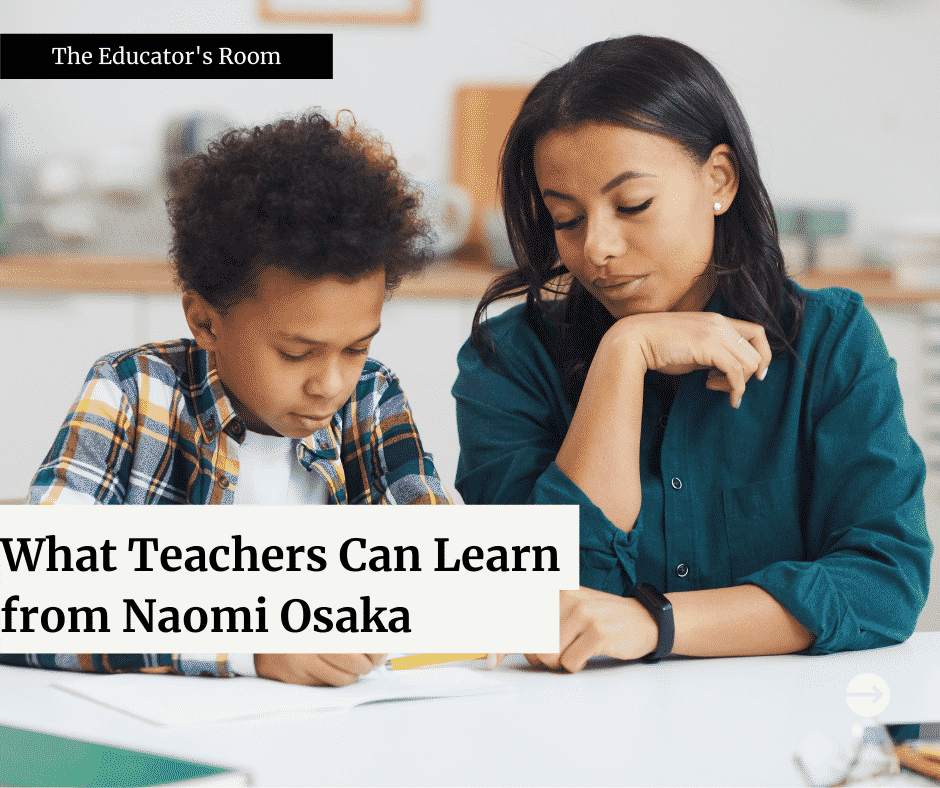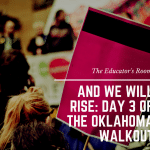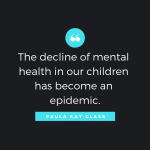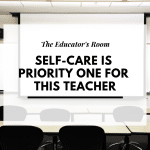Like seemingly everything else, issues surrounding the importance of mental health have been highlighted to an unprecedented level during this pandemic. Some might consider athletes, celebrities, and influencers an unlikely source for teachable moments, but the importance of those like Naomi Osaka is the perfect real-time, relatable, and relevant stories teachers should pay close attention to.
“Osaka is only 23 years old. She said she is an introvert and struggles with anxiety when speaking in public. She is a woman of color in a sport that remains predominantly white. She is answering questions in a media environment where a controversial comment, emotional breakdown or poorly-worded response can explode on social media and take on a life of its own” (Naomi Osaka wanted to protect her mental health. Here’s what she got instead, New York Times Post, 6/2/21).
My teacher brain could come up with multiple questions to spark the “critical think tank” in students from just this short paragraph alone:
- Do you think athletes and celebrities should just “accept” and “deal with” the pressure that comes with what they signed up for?
- Do you think that the fact that Osaka is a woman of color makes her experience in any way different?
- Do you think that the pressures of being in the spotlight, and that every gesture, comment, or opinion might end up on social media, contribute to mental health issues?
- How would you feel if every aspect of your life was under a public microscope?
As I type these questions, I also turn them on teachers: How would we, in a profession that the pandemic has also put into the limelight, answer these same questions?
[bctt tweet=”How would we, in a profession that the pandemic has also put into the limelight, answer these same questions?” username=””]
Stories like Naomi does not only highlight the discussion of the mental health of athletes, but of students and teachers as well. One could argue that the mental health of students is finally getting the attention and focus it deserves and that we have the pandemic to thank for that. Parents have even become more attentive to what could have potentially been mental health issues in their teens that have been lying dormant and unresolved for years. No one can argue the tremendous benefit of this newfound acceptance of much-needed help. In addition, socio-emotional lessons are becoming more of the norm, and have been more utilized as a part of either everyday check-ins, or infused within the discipline-specific lessons themselves. My only question would lie in the following: Are the same efforts to ensure mental health being bestowed on teachers as well?
“I’m so happy that Naomi Osaka used her platform to normalize saying ‘I’m not ok. I can’t mentally do this.’ We need to normalize protecting our mental and emotional health. Some don’t even take off for physical health reasons, let alone for emotional ones.”
These are the words from one of my closest teacher friends, and I couldn’t agree with her more. There are dozens of examples wherein a teacher’s mental health has been compromised and negatively exacerbated by this pandemic. I liken Naomi’s reluctance to meet with the press to my newfound apprehension to attend virtual school board meetings. I have become fearful of the brutal attacks on teachers who are now labeled as “fear-mongering, lazy” ones who are “unwilling to do their jobs” like every other “essential” worker who had to “suck it up” and continue working throughout the pandemic.
“…psychologists say Osaka should be lauded for speaking openly about her mental health in a culture still skeptical of wounds it cannot see, for asserting boundaries to keep herself safe even at cost to her career, and for challenging her sport, the media, and the public to rethink what we demand of athletes” (Naomi Osaka wanted to protect her mental health. Here’s what she got instead, New York Times Post, 6/2/21).
Will the media and public ever truly begin to “rethink” what they continue to demand of teachers? I wonder if anyone outside of the teaching profession understands the extreme joy we have when we finally establish a rapport with a student we have been trying to reach all year, only to be followed by sadness, anguish, and sometimes even depression that comes when we find out the “why’s” that explains a student’s behavior, lack of motivation and/or poor grades. We often don’t talk about the emotional impact of having to be a mandated reporter. The issues that lead us to that mandatory part of our jobs are some we not only take home but ones that often keep us up at night. We are often the Surrogate Parent, Advisor, Coach, Motivator, Counselor, all while putting on, and keeping up the daily brave face. There are times when I question how many of us do it.
”If an athlete is saying part of the job is too much for them, mental health experts say we are obligated to listen, to make space and to imagine a different way” (Naomi Osaka wanted to protect her mental health. Here’s what she got instead, New York Times Post, 6/2/21).
We can all agree that the “normal” way of schooling was not working and that we clearly need an entire overhaul of the educational system. The importance of the mental health of students, and teachers, should be “imagine[d] [in] a different way” as well. There are many different solutions that might be put forth, but I propose the following: Paid Mental Health Days. I can imagine this type of day off like this would be much more effective in my effort to renew both my body and mind if I knew I would it was meant to support and encourage positive teacher mental health. This would not be what some districts already have on the books as personal necessity, but in the same way, Naomi so bravely named the issue at hand, call the days what they are: Paid Mental Health Days.
“Experts say this moment is an opportunity to think about our expectations for athletes, and how we can help them be successful not only in their sports but in their lives” (Naomi Osaka wanted to protect her mental health. Here’s what she got instead, New York Times Post, 6/2/21).
This is an opportunity for not only many teachable moments for students but for society in general. We all strive to be successful in life, and that begins with strong, positive mental health. We have all been affected in some way by this pandemic, but stories like Osaka’s remind us that if we are not good to ourselves, we can’t be good to anyone else. Thank you Naomi Osaka speaking your truth and doing what was best for you and your mental well-being. The world is paying attention, and teachers are too.





